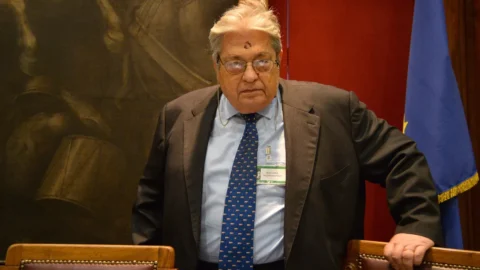If not now, when? Danielle Nouy, while held back by the resounding no from the European Parliament, insists on maintaining that the economic recovery of the Eurozone offers a once-in-a-lifetime opportunity to free the banks from the knot of non-performing loans. Is the head of Banking Supervision at the ECB wrong? “I think so,” he replies dryly Mario Noera, professor in the Finance department at Bocconi, attentive connoisseur of the problems of financial intermediaries.
But in this way, we will never free ourselves from the burden of past suffering, thus leaving a dangerous mortgage if the situation worsens again. It is not so?
“The fact is that suffering has halved since the peak of the crisis, confirming that the phenomenon is manageable. The problem is that we are now faced with a complicated past, which can only be managed over a long period of time, without forcing or shortcuts. A very aggressive policy in this field would only have the effect of provoking a new credit crunch which would in turn have the effect of jeopardizing a recovery which is still fragile”.
Is it really fragile? European GDP growth is at its highest for ten years and promises to overtake the US. Italy also revises its estimates upwards. What more do we ask?
“We are calling for the response of domestic demand which represents 60-70% of the potential for a solid recovery. On the contrary, also due to the choices of economic policy which continues to dominate in Europe, the growth of the economy continues to be based on non-EU demand. We are heavily dependent on the choices of US monetary policy as it embarks on a transition phase that presents more than one risk. The appointment of the new Fed chairman is a sign of continuity, or so it seems. But the trend is nonetheless oriented towards raising interest rates, especially if the US tax reform translates into an increase in the deficit”.
In short, woe to forward escapes. Otherwise we get hurt. But in doing so, don't we move the solution of the problem to infinity? A slowdown in the economy could be fatal.
“Let's not forget that we have already solved some of the problems. The strategy followed, in general, works. It is a question of speeding up the process thanks to the spaces that are granted to us by the economic situation and by the availability of the European institutions. But I don't think there are any miracle recipes or magic wands."
In the meantime, the stock market collapse of Credito Valtellinese, crushed by the amount of non-performing loans, makes an impression. And the distrust that surrounds the former Popolari, at the time considered the flagship of the system.
“They were the fruit of a self-referential and closed system but which had its own logic. The moral suasion of the Bank of Italy supervised the deposits of account holders but devoted little or no space to defending the interests of shareholders. When critical situations arose, and have arisen several times, the Bank moved to help the bank in crisis through some strong institution or strengthened by the action of the regulator. All in the name of moral suasion and maximum discretion. It is the scheme perfected during the management of Antonio Fazio, in a consistent and efficient way of him. But with a limit: favorable treatment for friends, ready to lend their work, not disinterested, at the service of the system”.
Perhaps the Bank of Italy has settled back on the old system and has been caught off guard.
“That system, which I don't regret, had its own logic that no longer works today. Unfortunately we have replaced it without adapting the laws and behaviors to the new situation. In reality, it was politics that underestimated the extent of the change. As Giulio Tremonti so effectively said, we traded the partners' greater understanding of our deficit for passive acceptance of the bail-in and all that it entailed. A short-sighted choice, which we paid dearly for despite attempts, some successful, to reduce the damage".
Now what?
"Now we must act with prudence but also with determination in a difficult situation which, due to our provincialism and the growing electoral fever, we try to forget".
That?
“It may be a coincidence but the European tightening on the banking front gained strength after the French elections. Emmanuel Macron raised the problem of new balances in Europe which foresee a change in economic policy. The German response was not long in coming. We agree on a breakthrough, said Wolfgang Schaeuble, but let's sort things out first. In other words, we teach the weak subjects a good lesson. That is, we make change impossible, because it is too expensive. Faced with this strategy, which has proven to be effective, a strong policy would be needed, capable of asserting our interests in the various negotiations, which rarely happens".
What to do then?
"The most effective choice seems to me to support the renewal action of the Bank of Italy under the direction of Mario Draghi".
Couldn't we have done more or better?
“I won't go into the merits of Ignazio Visco's confirmation, a choice made forced by the controversies that have invested the institution. But I don't think it makes sense to prosecute on the basis of those behaviors of moral suasion that belong to another historical era. And then".
And then what?
“I don't see much else out there. I believe that, if we really want to dispose of non-performing loans by favoring a more equitable and rational regime in terms of problem loans and the creation of a real market for NPLs, we cannot fail to help the action of via Nazionale, in the wake of the strategy indicated by Draghi . It is a process that must be accelerated, but with caution. Which is certainly not facilitated by the work of the Commission on banks, dominated as is inevitable, by political passion and pre-electoral interests”.





